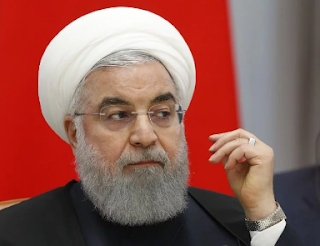The massive violation of human rights in Iran is one of the levers of government's actions in the Iranian regime
I would like to draw your attention to the excellent article that Dr. Majid Rafizadeh has written about this.
By Dr. Majid Rafizadeh
It is unfortunate that the Iranian regime’s human rights violations are attracting little attention from international media outlets. When President Hassan Rouhani was running for re-election, he famously criticized the human rights situation in the country and promised to improve it. But, since he won the election, the president evades discussing it.
Based on the latest developments, a report published by Amnesty International last month indicated that human rights abuses have reached a new high. This is happening while some world leaders and governments continue to label the Iranian president as a moderate political figure.
Iran’s Penal Code allows executions to be carried out by many different methods, such as hanging, stoning, and firing squad. And, according to the Oslo-based non-governmental organization Iran Human Rights, at least 273 people were executed in Iran in 2018. This made Iran second in the world when it came to the number of people it executed last year, and first in terms of the number of executions per capita. Due to a lack of transparency, the official number of people executed is believed to be higher.
It is not only the number of executions that is appalling, but also the nature of some of them. The executions involved juveniles, women and individuals from ethnic and religious minority groups, including Ahwazi Arabs, Kurds and Sunnis. Iran continues to be a leading executioner of children, as the number of juveniles executed increased in 2018. Although Iran has ratified the UN Convention on the Rights of the Child, Rouhani’s government has made no effort to alter the country’s Penal Code, which allows girls as young as nine to be executed.
In addition, at the discretion of the judiciary or the Islamic Revolutionary Court, many people are arrested on ambiguous charges, such as “spreading moharebeh” (corruption on earth), “waging war against God,” or endangering the country’s national security.
Despite pressure from some human rights organizations, a group of eight environmentalists who were arrested more than a year ago are still in detention
Dr. Majid Rafizadeh
Lack of due process, forced confessions and physical or psychological torture are prominent in the process through which the judiciary sentences defendants to the death penalty. As Iran Human Rights indicated: “In 2018, the Iranian authorities once again displayed their systematic violations of due process and the rule of law. Televised confessions, unfair trials, and reports of torture are reminders of the fact that sustainable improvements in the status of human rights and serious steps toward abolition of the death penalty are not possible without fundamental changes in Iran’s judicial system.”
Another issue is related to the deterioration of ordinary citizens’ basic freedoms, including freedom of expression, assembly, association, and religion.
Due to the increasing disaffectedness of the public with the regime, the theocratic establishment has increased its censorship of the media, restrictions on journalists, arbitrary arrests, inhumane punishments, the jamming of foreign satellite television channels, and the detention of human rights defenders. Many prominent human rights lawyers, including Nasrin Sotoudeh and her husband Reza Khandan, who defended or supported social movements, such as opposition to the forced wearing of the hijab, have been unfairly prosecuted.
Despite pressure from some human rights organizations, a group of eight environmentalists who were arrested more than a year ago are still in detention. On March 2, several Members of the European Parliament from a wide range of political parties wrote a letter to Rouhani stating: “We understand that the Iranian judiciary has accused the activists of using environmental projects as a cover to collect classified strategic information, but a committee established under your authority has found no evidence of these allegations.”
In its annual report, Amnesty International acknowledges that the human rights situation has “severely deteriorated” in Iran. The report details some of the inhumane punishments carried out by the regime’s forces, including floggings and amputations, as well as inhumane prison conditions and the shooting of Kurdish citizens by Iranian guards. For example, the report states: “In July, a man known as M.R. was tied to a tree in Razavi Khorasan Province and flogged 80 times. He had been convicted a decade earlier of consuming alcohol when he was 14 or 15 years old… In January, authorities amputated the hand of a man, referred to as A.Kh., in Mashhad, Razavi Khorasan Province, reportedly for stealing livestock and other valuables.”
Instead of appeasing the regime, the EU must pressure Iran for its excruciating human rights record. It is also incumbent on the international community, particularly the UN, to hold the Islamic Republic accountable for allowing such egregious human rights violations.
• Dr. Majid Rafizadeh is a Harvard-educated Iranian-American political scientist. He is a leading expert on Iran and US foreign policy, a businessman and president of the International American Council. Twitter: @Dr_Rafizadeh
This article was first published by arabnews




Comments
Post a Comment